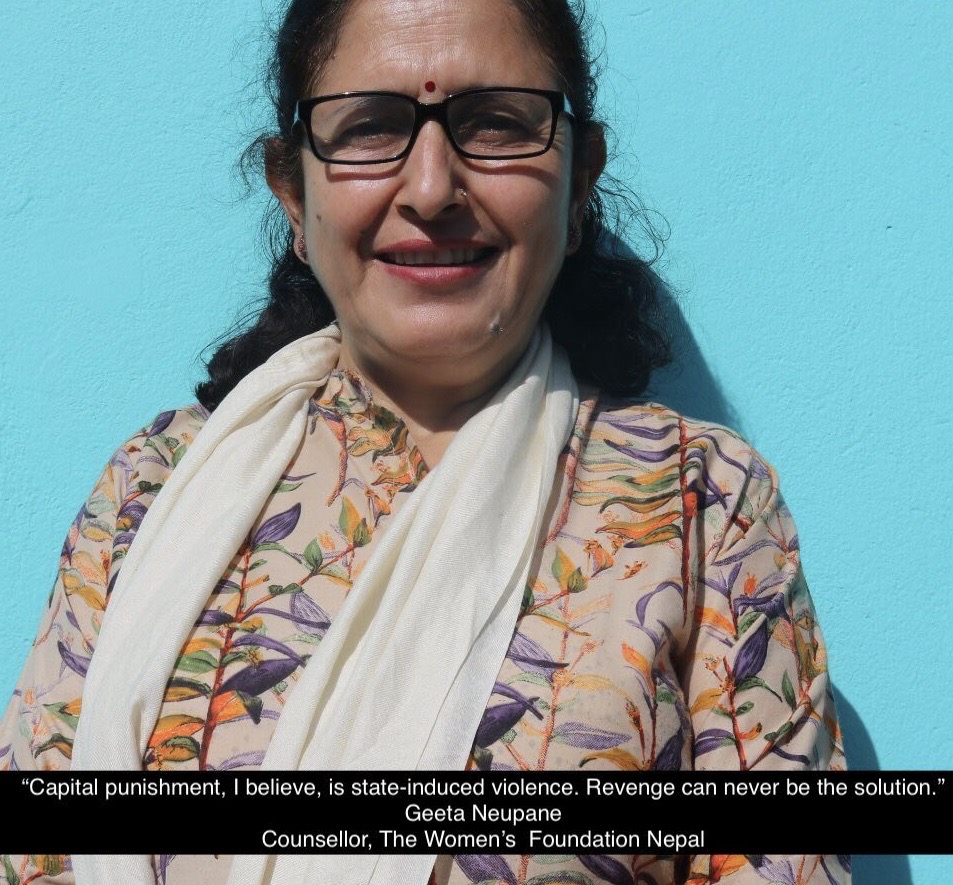An APEX Facebook post asking what people thought about capital punishment for rape saw replies in its favor. One respondent was upset enough to inquire, “Are you kidding, a rapist is allowed to take everything from a woman and we are actually debating whether he deserves capital punishment?” A related poll had 84 percent respondents voting yes for death for rapists. Recently, many women parliamentarians formed a loose network to lobby for stricter rape laws, including the provision of death penalty.
According to Nepal Police data, 1,480 rape cases were recorded in the fiscal year 2017/18 while the number rose to 2,144 in 2019/20. A vast majority seems to believe that for a crime as heinous as rape, the only fit punishment is sentencing the culprit to death. Nothing less will do.
But people clamoring for capital punishment are being driven by their emotions, say those who are against death-penalty’s reinstatement. Those in its favor fail to see how it will not be an effective deterrent for rape. But it might as well be argued that the attitude of eye for an eye, which is essentially what sentencing someone to death is, will only negate the years of progress we have made as a democratic society.
Better implementation of laws
Sabitra Dhakal, a human rights activist, believes capital punishment will institutionalize violence. Besides being a gross rights violation, sentencing someone to death, however horrifying the crime, is a regressive approach for a society and its legal system.
_20201010114811.jpg)
According to her, capital punishment isn’t a solution also because it puts more power in the hands of those who are already powerful and victimizes those who don’t have the means to get a good legal representation.
“Rather than bringing another legislation, the laws we now have should be better implemented,” says Dhakal, adding that some women parliamentarians, by asking for capital punishment, are looking for an easy way out. The alternative, Dhakal says, which comprises of a societal and systemic overhaul, seemingly requires too much work.
Nepal is a signatory of the UN convention, the ICCPR, which ensures people’s civil and political rights. One of its protocols is the abolition of death penalty. That aside, our constitution prohibits it as well. The guiding thought here is that capital punishment is a barbaric act.
Anecdotal evidences suggest death penalty doesn’t stop crimes, or more specifically in this case, capital punishment won’t put an end to rapes—rather the opposite.
We don’t have to look far either.
On 14 September 2020, a 19-year-old Dalit woman was gang-raped by four men in Hathras district in Uttar Pradesh, India. The woman died two weeks later. This incident came mere six months after the four convicts in Nirbhaya gang rape-and-murder were hung to death in March 2020.
Counsellor Geeta Neupane of the Women’s Foundation of Nepal strongly opposes the death penalty, which, she says, is a systemic instigator of violence contributing to a chain reaction of revenge. Neupane reiterates Dhakal’s sentiments when she says the best way to tackle rape would be stronger implementation of existing laws.

“We have stern laws for rapes and other atrocious offences. It’s just that there are many loopholes and corruption. Unfortunately, there is politics in everything,” says Neupane.
Efficient and effective legal system
Advocate Rahul Chapagain believes Nepal isn’t mature enough to handle capital punishment. If a country allows death penalty then all its other regulatory bodies—the investigative agencies, medical teams, and judiciary—need to be efficient and effective as well. Otherwise, it will be difficult to establish a crime and determine whether the accused is actually guilty.
_20201010114813.jpg)
“Rape cases are handled negligently in Nepal. There is no proper evidence collection and preservation, in terms of medical examination and photographs. What you usually have is a complaint and a writeup by the police stating the types of superficial wounds the victim had on her body,” says Chapagain.
This, he adds, makes it next to impossible for the justice system to ascertain that a crime has been committed and that the accused is the culprit beyond reasonable doubt.
According to advocate Ishan Raj Onta, media trials pose another grave challenge. Apart from having meticulous regulatory bodies, the media must also exercise control and be governed by a certain code of conduct. Sadly, that isn’t always the case.
_20201010114756.jpg)
“The media is quick to portray someone as guilty even in an ongoing investigation. This can cloud people’s judgement. How can capital punishment be a recourse in such a scenario?” he asks.
Another argument against reinstating capital punishment is that our justice system is retributive and reformative—operating under the principle that criminals too need to be given a second chance. The idea behind life imprisonment or a jail sentence in general is not only to punish someone but to make the prisoner realize his/her mistakes and change.
Raunaq Singh Adhikari, an advocate with Kantipur Law Associates, believes people—hardened criminals included—can change, given a chance. Besides, right to life is a fundamental right that no one can take away from you. Adhikari adds that fear of punishment, however harsh, cannot make someone think rationally and morally when impulse takes over.
_20201010114817.jpeg)
Punishment alone won’t stop rape
Activist Dhakal says capital punishment is reactive. What we should instead focus on are preventive measures if our goal is to cut back on and eventually stop the incidents of rapes and murders.
“It’s important to understand that punishment alone doesn’t address the root cause of crime,” says Onta. He adds that if the idea is to dish out maximum suffering to the perpetrator, as those lobbying for capital punishment claim, then death penalty actually doesn’t serve the purpose.
“Wouldn’t you rather have the culprit jailed for life? Capital punishment means his suffering will end in a few minutes,” he says.
However, Onta says that curbing rape isn’t something that should be dealt with in isolation. There many other factors to be kept in mind.
“Rape isn’t a new issue. It’s been there since the start of civilization. If we are to ever put an end to it, the reform must start from home and very early on,” he says.
Onta attributes rapes and gender-based violence to the society’s stringent gender roles. In our patriarchal society, it’s not uncommon for men to feel inherently superior.
Sanjita Timsina, a senior program coordinator at WOREC Nepal, says the way society looks at women—as the weaker sex—is largely the reason behind rapes. Raping someone shows you have no respect for that person. It’s a power play, she says. Chapagain agrees, claiming he has witnessed instances where the culprit seemed surprised to know he had committed a crime.

“It might sound strange but many men who rape seem to have no idea that it’s wrong to force yourself on someone. There’s simply no awareness. Many have the mindset that women need to comply with their wishes and demands, that they should be subservient,” he says.
To tackle this, boys and girls, Onta says, should be allowed to socialize and intermingle as early as possible without being made to behave a certain way because of their gender.
Neupane, the counsellor, adds it all boils down to raising your sons a little differently, telling them to respect the opposite sex, and teaching them the values of equality and acceptance in their formative years.
Certainty of punishment rather than severity
Apart from exploring long-term solutions, our legal system should also better protect women and rape victims.
It’s sad that victims often get blamed for the crimes—‘She must have said or done something to instigate violence’, ‘She shouldn’t have been out alone at that hour’, ‘And why wasn’t she “modestly” dressed?’ It’s this victim-blaming mindset that leads, first, to less reporting of the crime, and second, makes life after rape all the more miserable for the victim as well as her family. A fast track hearing process that doesn’t subject the victim to harassment and making the law more women-friendly could be the way out.
Advocate Aparmita Shakya says there will continue to be rapes so long as rapists don’t fear or hold the country’s law enforcement mechanism in high regard, and think they will get away with no more than a slap on their wrist.
_20201010115436.jpg)
“It’s not the severity of the sentence but the assurance that punishment will be meted out, and on time, that will deter rapes,” she says.
Manju Khatiwada, undersecretary, National Human Rights Commission, agrees with Shakya and reemphasizes the need for an unbiased legal system that guarantees punishment.
_20201010114806.jpg)
“Criminals often have a kind of ‘I-know-people-in-right-places’, and ‘I-can-get-away-with-this’ attitude, which are made worse by the fact that our legal system takes a long time to prosecute the guilty,” says Khatiwada.
She adds that she is against capital punishment not only because it violates basic human rights but also because there have been many cases, elsewhere in the world, where people have been wrongly punished.
“The loss of an innocent human life is irreparable,” she says. “Killing every person who rapes a woman isn’t the solution. For that will fuel hatred and create an unruly society.”
Take responsibility of our women
Pushpa Bhusal, a federal parliamentarian, says the country has to create a favorable environment for rape victims to report the crime and assure them justice. It’s unsettling to see how Nepal has failed its women, she says.
_20201010114813.jpg)
“We need better mechanisms because the ones we now have aren’t working,” she says, explaining the rationale behind forming a loose taskforce to look into laws on rapes and gender-based violence.
“One of our arguments is that if the victim is a minor then the rapist should get capital punishment. But it’s not a stand-alone argument. We are first urging the country to do everything in its power to ensure women’s safety. But if nothing can stop rapes, then reinstating the death penalty can be an alternative,” she says.
But Timsina of WOREC Nepal is sure we don’t have to go that far. “One thing we can do is throw out the 35-day limitation on lodging an FIR,” she says. What usually happens because of this limitation, Timsina says, is that there is a lot of mediation in that time. The victim is often put under pressure to keep quiet and given many assurances. Things get drastically worse for rape victims when the statute of limitation expires.
The solution, experts believe, lies not in increasing the harshness of punishment but in establishing a system where each department that looks into the crime does its job fairly, on time, and with unwavering focus. Another important aspect would be to create conditions where the rape victim isn’t stigmatized and justice is assured.
As Onta puts it, curbing rapes is a philosophical discourse with many social and legal aspects to it. There isn’t a one-size-fits-all solution.











